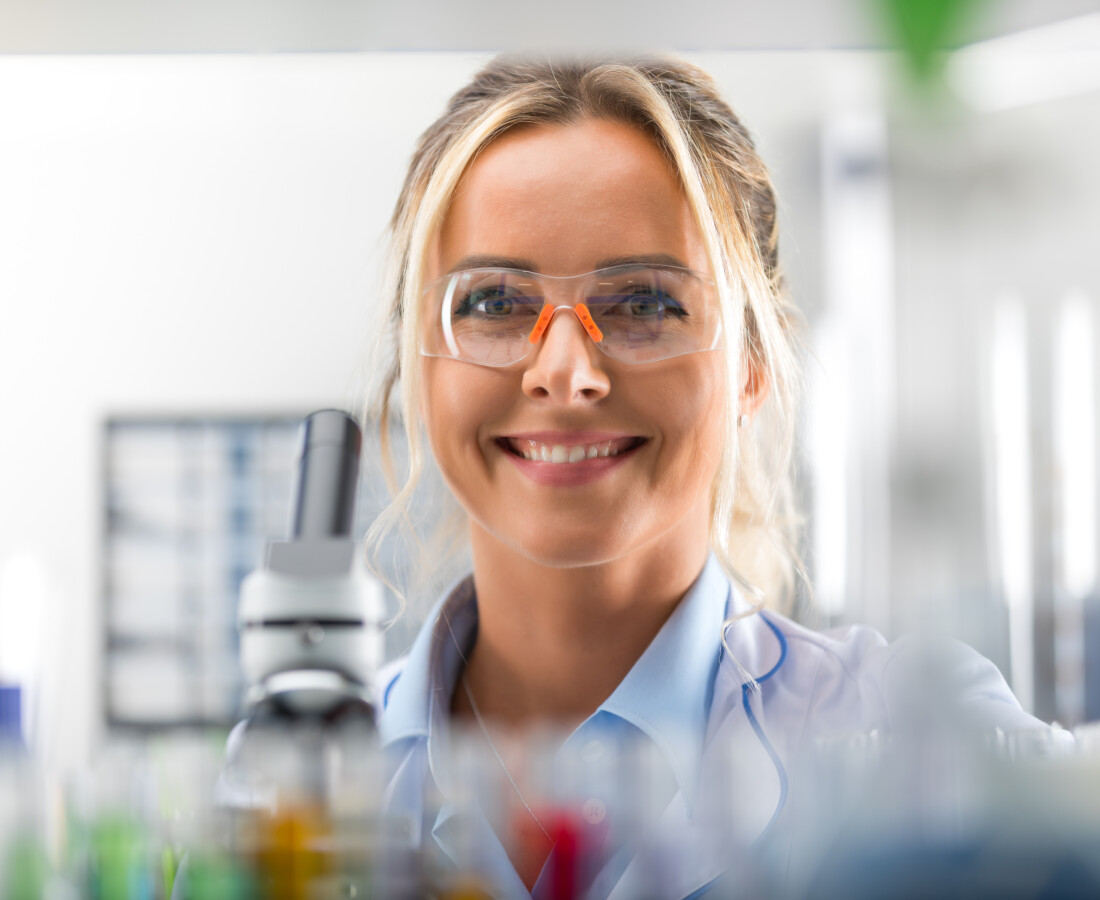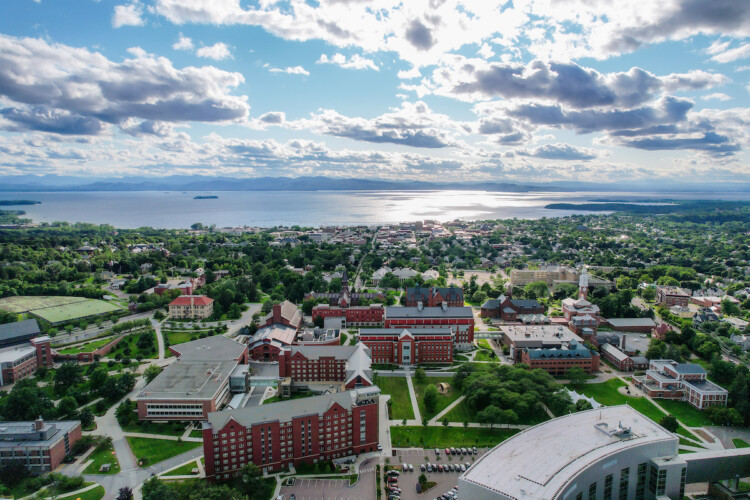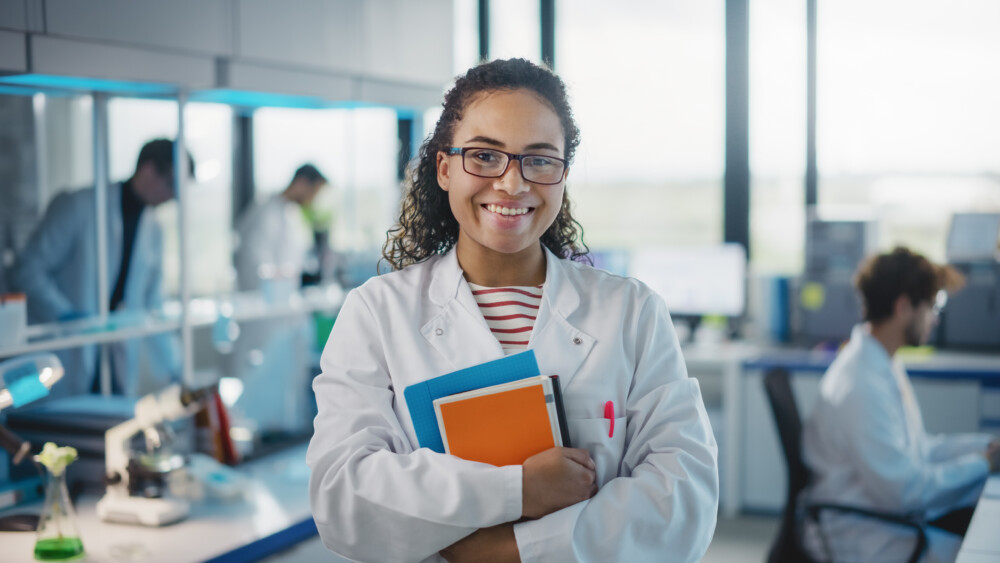Overview
Take the First Step Towards a Rewarding Medical Laboratory Science Career
If you’ve been thinking about working in healthcare, UVM’s Post-Baccalaureate Medical Laboratory Science Program can help you achieve your goal and find meaningful work. Lab science is an essential component of the healthcare system that allows health care professionals to make data-driven decisions to prevent, diagnose, manage, or treat disease.
Students who complete the program (all courses are taught on campus, not online) are eligible to take the American Society for Clinical Pathology certification exam, required for work in many clinical diagnostic laboratories, and will be prepared to demonstrate:
- Competency to perform a full range of testing in contemporary medical labs
- Proficiency to problem-solve, troubleshoot, interpret results, use statistical approaches to evaluate data, and participate in developing and evaluating test systems and interpretive algorithms
- Professional conduct as a member of the healthcare team
- Effective communication skills to ensure accurate and appropriate information transfer
- Administrative knowledge of quality assurance, quality improvement, laboratory education, fiscal resource management/operations, information management, and clinical decision making
- Application of safety and governmental standards as applied to medical laboratory practice
What sets UVM apart
Medical Center on Campus
UVM’s Post-Bacc medical lab science program is based at a leading academic medical center and teaching hospital and is a partnership with the College of Nursing and Health Sciences (CNHS).
Guidance from Health Professionals
Faculty offer professional preparation, personalized advising, close community and hands-on experience – early and often.
Practical Lab Experience
You will work one-on-one with a staff technologist as you gain hands-on experience in diagnostic laboratory medicine at one of our 12 clinical lab affiliates, including UVM Medical Center.

Exam Pass Rate, Placement And Graduation Rates
A high percentage of our students successfully pass their exam and find jobs
- 89% of students pass the ASCP Board of Certification Exam. Well above the National Accreditation Agency for Clinical Laboratory Sciences (NAACLS) benchmark of 75 percent.
- 96% of students find employment or continue their education within one year.
The above data represents the three-year program average. For more detail on program effectiveness, please see the following table listing student outcomes for the Medical Laboratory Science program
Program Highlights
Mission
The mission of the University of Vermont’s Medical Laboratory Science Program is to educate, train, and graduate professionally competent and ethical individuals committed to lifelong learning and prepared to meet current and future workplace challenges in medical laboratory science.
Educational Goals
Students who complete the program will:
- Be competent to function as entry-level medical laboratory scientists in any clinical laboratory environment
- Demonstrate problem-solving and critical-thinking skills in the clinical setting
- Demonstrate effective written and verbal communication skills
- Demonstrate the highest professional and ethical standards
Learning Outcomes
Upon completion of the certificate program in Medical Laboratory Science, students will demonstrate:
- Competency to perform a full range of testing in a contemporary clinical laboratory encompassing pre-analytical, analytical, and post-analytical components of laboratory services;
- Proficiency to interpret results, use critical thinking skills to problem solve, and apply statistical approaches when evaluating data;
- Ability to identify and trouble-shoot technical problems in laboratory procedures and instrumentation;
- Professional conduct as a member of the healthcare team and effective communication skills;
- An understanding of basic concepts related to quality assurance, quality improvement, laboratory education, administrative operation, information technology, and clinical decision making;
- Ability to critically evaluate laboratory results and correlate them with human disease;
- Ability to determine the appropriate utilization of laboratory tests for screening, monitoring, therapy, and prognosis of human diseases;
- Adherence to standard operating procedures regarding safe work practices related to clinical specimens and infectious agents;
- Application of governmental regulations and standards as applied to medical laboratory practice in the clinical setting.
Certification
Graduates of the Medical Laboratory Science Clinical Laboratory Science concentration are eligible to take the American Society for Clinical Pathology certification exam. View licensure requirements by state. Granting of the degree or certificate in Medical Laboratory Science is not contingent on taking or passing the exam.
Accreditation
The Medical Laboratory Science Program, Clinical Laboratory Science Concentration at the University of Vermont has been re-accredited for the period April 30, 2022 – April 30, 2032 by the National Accrediting Agency for Clinical Laboratory Science, 5600 N. River Rd., Suite 720, Rosemont, IL 60018-5119; (773) 714-8880.
The American Society for Clinical Laboratory Science (ASCLS) is the pre-eminent organization representing the clinical/medical laboratory profession.
Admissions
Eligibility
This program is designed for graduates with an earned baccalaureate degree who wish to become eligible for national certification in Medical Laboratory Science. Admission to the program is competitive, and selection will depend on space availability and academic standing among the candidates.
The number of positions in the Medical Laboratory Science Program is based on the number of clinical positions available to University of Vermont MLS students at our clinical affiliates and spaces are limited. If you are admitted, you will be guaranteed a clinical position only in the anticipated year of completion.
Admission Requirements
- You must hold a bachelor’s degree or higher from an accredited institution by the time you start the program. International students must have their credentials verified by the World Education Evaluation Services.
- A minimum grade point average of 3.0 is required.
- The following courses (or equivalent) must be on your transcript to be considered:
- General Chemistry
- 8 credits
- Biology or Anatomy and Physiology
- 8 credits
- Mathematics
- 3 credits
- Organic Chemistry or Biochemistry
- 4 credits
- Introductory Microbiology
- 4 credits
- General Chemistry
Curriculum
Completing these MLS Requirements (or Categorical, see note below) makes you eligible for the certification examination needed to practice in the profession. Certification is achieved by successfully passing the Medical Laboratory Science (MLS) exam by the American Society for Clinical Pathology (ASCP).
To be eligible for this exam, you must satisfy these requirements:
- Baccalaureate degree from a regionally accredited college or university, which must include 16 credit hours of biological sciences (with one semester in microbiology)
- 16 credit hours of chemistry (with one semester of organic or biochemistry)
- One semester of mathematics
- Successful completion of an NAACLS-accredited program in Medical Laboratory Science at the University of Vermont within the last five years
We will review your transcript to determine the Biology, Chemistry, and Mathematics credit hours that are acceptable.
Required Courses for MLS Certification
| Clinical Chemistry | 7 credits | MLS 3100, 3110 |
| Hematology | 4 credits | MLS 3200 |
| Clinical Microbiology | 7 credits | MMG 3220; MLS 3300 |
| Immunology | 3 credits | BHSC 3420/MMG 3230 |
| Immunology Lab | 1 credit | BHSC 3440 |
| Immunohematology | 4 credits | MLS 3400 |
| Applied Molecular Biology | 3 credits | BHSC 3810 |
| Applied Molecular Biology Lab | 1 credit | BHSC 3820 |
| Topics in MLS | 3 credits | MLS 3900 |
| Clinical Practicum | 12 credits | MLS 3192, 3292, 3392, 3492 |
Completing the MLS Categorical Requirements in Blood Bank, Hematology, Chemistry, or Microbiology allows you to be eligible for the certification examination in one area to practice in the profession. Certification is achieved by successfully passing the Technologist Categorical exam offered by the American Society for Clinical Pathology (ASCP).
Required Courses for Each MLS Categorical Certification
| Blood Bank | Hematology | Chemistry | Microbiology |
| MLS 3200 – Hematology | MLS 3200 – Hematology | MLS 3100 – Clinical Chemistry I | MMG 3110 – Bacterial Genetics |
| MLS 3400 – Immunohematology | MLS 3292 – Clinical Practicum: Hematology | MLS 3110 – Clinical Chemistry II | MLS 3300 – Clinical Microbiology II |
| MLS 3492 – Clinical Practicum: Immunohematology | BHSC 3420/MMG 223 – Immunology | MLS 3192 – Clinical Practicum: Chemistry | MLS 3392 – Clinical Practicum: Microbiology |
| BHSC 3420/MMG 223 – Immunology | BHSC 3440 – Immunology Lab | BHSC 3420/MMG 223 – Immunology | BHSC 3420/MMG 223 – Immunology |
| BHSC 3440 – Immunology Lab | BHSC 3810 – Applied Molecular Biology | BHSC 3440 – Immunology Lab | BHSC 3440 – Immunology Lab |
| BHSC 3810 – Applied Molecular Biology | BHSC 3820 – Applied Molecular Biology Lab | BHSC 3810 – Applied Molecular Biology | BHSC 3810 – Applied Molecular Biology |
| BHSC 3820 – Applied Molecular Biology Lab | BHSC 3820 – Applied Molecular Biology Lab | BHSC 3820 – Applied Molecular Biology Lab |
Biomedical and Health Sciences: Applied Molecular Biology(BHSC 3810 A)Quick Course ReviewQuick View
This section is opening soon – set reminder
CRN92598Credits3InstructorsMelissa Scheiber- DatesDays of the WeekTimes
- to Tue Thu to
Biomedical and Health Sciences: Applied Molecular Biology Lab(BHSC 3820 A)Quick Course ReviewQuick View
This section is opening soon – set reminder
CRN92599Credits1InstructorsMelissa Scheiber- DatesDays of the WeekTimes
- to Mon to
Medical Laboratory Science: Clinical Chemistry I(MLS 3100 A)Quick Course ReviewQuick View
This section is opening soon – set reminder
CRN92321Credits4InstructorsKoela Ray- DatesDays of the WeekTimes
- to Mon Wed Fri to
- to Tue Thu to
Medical Laboratory Science: Hematology(MLS 3200 A)Quick Course ReviewQuick View
This section is opening soon – set reminder
CRN90525Credits3InstructorsPaula DemingMelissa Scheiber- DatesDays of the WeekTimes
- to Tue Thu to
Medical Laboratory Science: Clinical Microbiology II(MLS 3300 A)Quick Course ReviewQuick View
This section is opening soon – set reminder
CRN91817Credits3InstructorsDimitry KrementsovEyal Amiel- DatesDays of the WeekTimes
- to Mon Wed Fri to
Medical Laboratory Science: Immunohematology(MLS 3400 A)Quick Course ReviewQuick View
This section is opening soon – set reminder
CRN90135Credits4InstructorsKoela Ray- DatesDays of the WeekTimes
- to Tue Thu to
- to Tue Thu to
Biomedical and Health Sciences: Immunology(BHSC 3420 A)Quick Course ReviewQuick View
This section is closed
CRN15248Credits3InstructorsDimitry Krementsov- DatesDays of the WeekTimes
- to Tue Thu to
Biomedical and Health Sciences: Immunology Lab(BHSC 3440 A)Quick Course ReviewQuick View
This section is closed
CRN12879Credits1InstructorsKoela Ray- DatesDays of the WeekTimes
- to Mon to
Medical Laboratory Science: Clinical Chemistry II(MLS 3110 A)Quick Course ReviewQuick View
This section is closed
CRN12533Credits3InstructorsKoela Ray- DatesDays of the WeekTimes
- to N/ASee Notes
- to Mon Fri to
Micr & Molecular Genetics: Adv Medical Microbiology w/lab(MMG 3220 ZRA)Quick Course ReviewQuick View
This section is closed
CRN11839Credits4InstructorsRebecca GuyKari Hodge- DatesDays of the WeekTimes
- to Tue Thu to
There are no courses that meet this criteria.
Career Outlook
Medical Laboratory Science is a dynamic and exciting profession that continually changes as new scientific and medical knowledge advances.
What Does A Medical Laboratory Scientist Do?
Medical laboratory scientists develop, perform, and evaluate laboratory tests leading to health assessment, diagnosis of disease, and monitoring therapeutic treatment. They use sophisticated biomedical instruments to generate accurate and reliable test results, interpret quality assurance parameters, troubleshoot analytical instruments, and develop and modify testing methods.
It is estimated that 70 percent of all medical decisions are based on laboratory test results produced and reported by medical laboratory scientists.
Where do Medical Laboratory Scientists Work?
Medical laboratory scientists work in a variety of settings from hospitals to biotech companies. Once you pass the American Society for Clinical Pathology certification exam, you’ll be qualified to work in:
- Hospital and private clinical laboratories
- Research institutions: develop and test new methods
- Public health: state health laboratories, community health projects, environmental testing, Peace Corps
- Specialty laboratories: forensics, fertility, veterinary
- Biotechnology: product research/development, data analysis, quality assurance
- Sales and marketing: biomedical supply, pharmaceutical companies
- Laboratory computer systems
- Compliance inspectors: state and federal government, accreditation agencies
- Infection control
What’s The Job Outlook?
When it comes to job demand, medical laboratory scientists are currently in high demand. The Health Resource and Service Administration (HRSA), expects demand for clinical laboratory scientists/technologists to grow by 19 percent by 2030, a much faster than average growth rate than all other occupations.
This growth is connected to an increased focus on preventative healthcare, with more tests being run to catch and diagnose potential health issues early on. Another factor contributing to the demand for medical laboratory scientists is an aging population that requires more diagnostic tests and treatments. Moreover, the pandemic highlighted the need for timely test results to curb the spread of disease.
If you’re considering a career in medical laboratory science, you can feel confident that there will be job opportunities available. Not only is demand increasing, but the profession also offers a median pay of $57,800 per year and a range of opportunities for advancement. Plus, with ongoing advances in technology and medicine, the field is always changing and evolving, making for a challenging and exciting career path.For more information visit the Coordinating Council on the Clinical Laboratory Workforce.
Practica
The Medical Laboratory Science Program will provide you with a high-quality education focused on human health and disease, and position you for intensive practical laboratory experience during the last semester of your anticipated year of completion. The semester-long practicum will take place at any one of our clinical program affiliates. Practicum assignments are made based on availability of space at the affiliate site and student preference. The laboratory practica offer state-of-the-art computer instrumentation using the latest methods and technologies. During your practicum experience, you will apply theoretical knowledge and learn the skills to perform laboratory procedures, recognize and solve problems, assume future leadership roles, carry out research, and educate others. You will work one-on-one with a staff technologist as you gain hands-on experience in diagnostic laboratory medicine.
Clinical Laboratory Science Affiliates
- Albany Medical Center, Albany NY
- Beth Israel Deaconess Medical Center, Boston, MA
- Brigham and Women’s Hospital, Boston, MA
- Champlain Valley Physicians Hospital, Plattsburgh, NY
- Elliot Hospital, Manchester, NH
- Glens Falls Hospital, Glens Falls, NY
- Massachusetts General Hospital, Boston, MA
- NorDx, Portland and Scarborough, ME
- Rutland Regional Medical Center, Rutland, VT
- St. Peter’s Hospital, Albany, NY
- Yale New Haven Hospital, New Haven, CT
- The University of Vermont Medical Center, Burlington, VT
FAQ
Tuition will vary whether you’re in-state or out-of-state, how many credits you take each term, and your personalized academic plan. Tuition is charged on a per-credit basis up to 12 credits, which is full-time. There is no additional tuition charged for 12 to 19 credits.
Tuition and Fees for Fall/Spring Semesters
Tuition and Fees for Summer Sessions
Students may be eligible for federal financial aid in the form of Federal Direct Stafford and/or Federal Direct PLUS loans or alternative (private) student loans.
To determine the types of aid for which you may be eligible and the process for applying, please visit the Non-Degree Financial Aid page on the UVM Student Financial Services website.
- Complete the application form.
- Request official transcripts for all undergraduate and graduate work. If you have taken any college-level courses, you must request an official transcript from each institution you attended.
Transcripts should be mailed to:
University of Vermont
Post-Bac MLS Program
302 Rowell, 106 Carrigan Drive
Burlington, VT 05405 - Submit two letters of recommendation from people who know you well enough to give an informed opinion of your intellectual ability, capacity for sustained effort, and personal qualifications. One academic reference is suggested, but not required.
- Submit a personal statement. Please describe your reasons for wishing to pursue a career in healthcare. Include any medical-related experience you have. Limit your personal statement to three typed, double-spaced pages. Your personal statement can be uploaded at the end of this form, sent by mail to the address above, or emailed to bhsc@uvm.edu.
If application materials arrive separately, they will be matched with your file.
Our Post-Bacc MLS program coordinator is available to help you with the application process. Call 802-656-3811 or email to bhsc@uvm.edu.
All correspondence should be addressed to:
University of Vermont
Post-Bac MLS Program
302 Rowell, 106 Carrigan Drive
Burlington, VT 05405
Advising and Student Support
You have the goal; we’ll help you achieve it
We are dedicated to helping you access UVM. It is our role to get to know your experience and goals, assist you in choosing courses, guide you through registration, and serve as your resource throughout your time at UVM.
Curious if your past college credits apply at UVM? Want to understand where a program will take you after completion? Looking for resources for financial aid, tutors, or UVM policies? We’re here to help.


